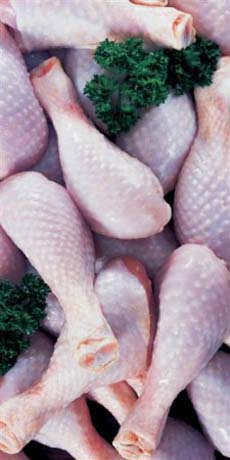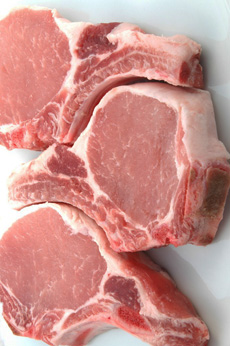TIP OF THE DAY: Don’t Wash Meat & Poultry Before Cooking
 Don’t wash raw poultry, meat or seafood. Photo courtesy Chicken.org.au. |
Recently we received a pitch for a line of food cleaning sprays that purport to eliminate harmful bacteria. “Outdoor cooking leads to more trips to the hospital because of the improper handling of meats and veggies while grilling,” it advised. “Many of us take meat out of the packaging and put it right on the grill without doing anything but seasoning it. This can lead to salmonella poisoning, food poisoning and much more if you are not properly handling your beef, chicken and fish.”
The company went on to promote its “all-natural, organic, earth and consumer green, meat and fish cleaner to ensure that your meal is clean and free of anything that can make you sick.” We decided to drill down on this claim, and came across this information from the USDA Food Inspection and Safety Service. Their recommendation: don’t wash or rinse the proteins. Not only is there no scientific evidence to support grandma’s practice of washing the raw proteins; The U.S. Department of Agriculture cautions against it due to potential cross contamination. WASHING FISH, MEAT & POULTRY Washing raw fish, seafood, poultry, beef, pork, lamb or veal before cooking it is not recommended, says the USDA. The bacteria in the juices can be spread to other foods, utensils and surfaces. This potential cross-contamination is the opposite of making your meat or poultry safe. |
|
|
Why? Some of the bacteria are so tightly attached to the flesh that you could not remove them no matter how many times you washed the food. Other types of bacteria can be easily washed off and splashed onto the surfaces of your kitchen: counter, faucet, utensils and so forth. Failure to clean these contaminated areas and items can lead to foodborne illness. Cooking (baking, broiling, boiling or grilling) to the proper temperature kills all the bacteria, so washing food is not necessary. Using a food thermometer is the only sure way of knowing if your food has reached a high enough temperature to destroy foodborne bacteria. Cook all raw beef and veal steaks, roasts, and chops to a minimum internal temperature of 145 °F (or higher) as measured with a food thermometer before removing meat from the heat source. For safety and quality, allow meat to rest for at least three minutes before carving or consuming. |
||
|
SOAKING MEAT & POULTRY
What about soaking poultry in salt water (brining)? The USDA advises that this is a personal preference and serves no purpose for food safety. If you choose to soak poultry, preventing cross-contamination when soaking and removing the poultry from the water is essential. Meat or poultry should be kept in the refrigerator while soaking. What about washing or soaking pork products? Some people soak country ham, bacon, or salt pork because they think it reduces the sodium or salt enough to allow these products to be eaten on a sodium-restricted diet. However, says the USDA, very little salt is removed by washing, rinsing or soaking a meat product and the practice is not recommended. WASHING EGGS Do not wash eggs before storing them. Washing is a routine part of commercial egg processing and the eggs do not need to be washed again. |
 Don’t rinse pork products, either. Photo courtesy RipeNRawOrganics.com.au. |
|
|
Commercially, bloom, the natural coating on just-laid eggs that helps prevent bacteria from permeating the shell, is removed by the washing process and is replaced by a light coating of edible mineral oil, which restores protection. Additional washing of the eggs could increase the risk of cross-contamination, especially if the shell becomes cracked. WASHING PRODUCE Before eating or preparing fresh fruits and vegetables, wash the produce under cold running tap water to remove any lingering dirt and pesticides. This reduces bacteria that may be present. If there is a firm surface, such as on apples or potatoes, the surface can be scrubbed with a brush. Do not wash fruits and vegetables with detergent or soap. You could ingest residues from soap or detergent absorbed on the produce. When preparing fruits and vegetables, cut away any damaged or bruised areas because bacteria that cause illness can thrive in those places. Immediately refrigerate any fresh-cut items such as salad or fruit for best quality and food safety.
|
||